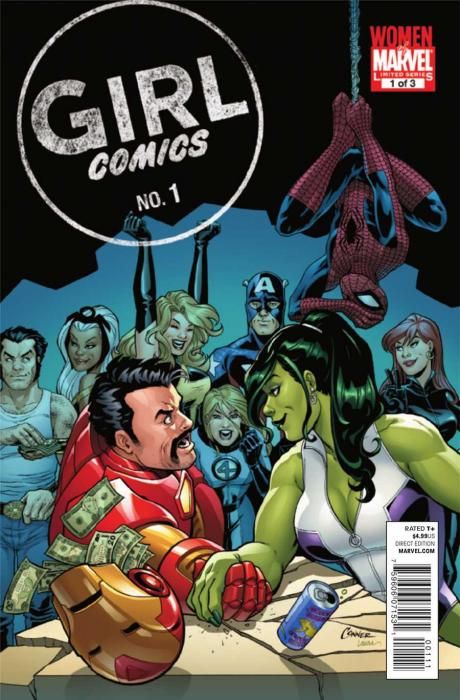There is a fine line between celebrating diversity and exploiting it. When I first heard of "Girl Comics," I thought certainly Marvel was playing towards exploitation with a comic series exclusively created by women. Later I tried to be positive, thinking it would be a fabulous opportunity for Marvel to turn the spotlight to creators and characters who normally don't receive much glory. Colleen Coover's introduction was along the lines of what I was expecting after I mulled this concept over.
"Moritat," featuring Nightcrawler, was disappointing. While Ming Doyle's art is significantly different from most -- and well-suited to a Nightcrawler story -- her angle kept jumping around, complicating the story unnecessarily. Aside from the Germanic setting, I'm not sure why this story needed Nightcrawler and not any other cipher to fill the role reversal played out within. Another option G. Willow Wilson could have pursued would have been to make the Nightcrawler story actually an Amanda Sefton story.
Trina Robbins and Stephanie Buscema deliver a tale set in the 1960s that draws Venus (of "Agents of Atlas" fame) back to her "mortal" roots. Buscema's art is equal parts Lowell Hess, Trina Robbins, and Darwyn Cooke. The exuberant colors for this story really help bring it home as a period piece.
Valerie D'Orazio and Nikki Cook deliver a Punisher tale that shows how Frank Castle deals with pedophiles without showing anything. Lucy Knisley's two-page Doc Ock story is offbeat enough to be cute.
The Franklin and Val story is a cute little nod to Hansel and Gretel, but with a Fantastic Four twist on the beginning and the end. Agnes Garbowska's style is instantly recognizable if one has seen her work before. Here, it works with Franklin and Val. I'd like to see Robin Furth and Garbowska push the envelope a little more, focusing on what makes the characters original and not stand-ins for a slight twist to an old tale.
The final story in the issue is an investigation into the relationship between Scott Summers and Jean Gray that could only make sense once you reach the end. Devin Grayson and Emma Rios tell a story that feels like it contributes to the Marvel Universe beyond this issue.
What would an all-female book be without a little bit of cheesecake? Marvel couldn't avoid having a pinup in here, so they dropped in a She-Hulk drawing by Sana Takeda that gives a wink and a nod to the "She-Hulk" series popularized by John Byrne.
There are two spotlights (two page text pieces) in this issue, featuring Flo Steinberg and Marie Severin. These are nice interstitials to the overall book, and they add to the compilation nicely.
Overall, I found this collection to be underwhelming, in choice of character and content of story. I think Marvel would be better served to promote their female creators by letting them just create on Marvel's major titles. I'm not sure if this title is supposed to serve as a tryout book for creators or characters, but it is rather thin on character, even if it is rich on creator. I'd love to see many of these creators given a chance to take on other characters in other situations.

